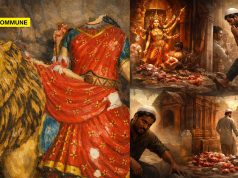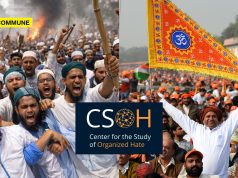
Puthaandu or the Tamil New Year marks the first day of the first month (Chithirai) of the Hindu Tamil calendar that is based on the solar cycle. It usually falls on the 14th of April of the English Gregorian calendar.
Not just by Tamil Hindus, the commencement of the new year is celebrated as Vishu in Kerala, Rongali Bihu in Assam, Pohela Boisakh in Bengal, Bishuva Sankranti in Odisha, Jud Sheetal in parts of Bihar, etc. Even countries like Malaysia, Indonesia, Bali, Cambodia, Laos, Sri Lanka, Thailand, etc also celebrate the traditional New Year around this time.
However, the DMK and other ‘Dravidian Stockists’ observe Pongal (which occurs around January 14) as Tamil New Year as they argue that celebrating Chithirai 1 as the beginning of a new year amounts to following a ‘Brahmin-dominated’ or Sanskritic tradition which goes against Dravidian ideologies.
But no matter how much the ‘Dravidian Stockists’ try to distort and deride our culture which is based on science, there is also enough evidence in ancient Tamil literature that the first day of the Chithirai month marks the beginning of a new year.
“திண்ணிலை மருப்பின் ஆடு தலையாக விண்ணூர்பு திரிதரும் வீங்கு செலல் மண்டிலம்”
“Thinnilai Marruppin Aadu Thalaiyaaga Vinnurpu Thiritharum Veengu Sella Mandilam”
The above quote by Nakkeerar, a famous Tamil poet of the Sangam age, notes that the world runs with the goat (Mesha Rasi/Aries) as the first sign.
Not only in this Sangam song, many ancient Tamil songs that are about the astronomical predictions and changes in position of planets and starts.
Kudalur Kizhar is another poet of the Sangam era whose poems are part of the Kurunthogai (166, 167, 214) and Purananuru (229). In the poem in Purananuru, where he predicts the death of Chera ruler Yanaikatchei Mantharanj Cheral Irumborai (62-42 BC), he mentions Chithirai month and Mesha rasi.
In essence, the first month of the year is the month of Chithirai during spring when the Sun enters Mesha (Aries) zodiac sign. The year ends with the month of Panguni when the sun comes up in Pisces. This is the solar calendar that is followed across the country while there are many communities in different states that follows the lunar calendar.

There is a reason why the harvest festival is celebrated in Thai (January) and the New Year in Chithirai (April). Earlier, after harvesting the crops in the Thai month (January-February) farmers take short period of rest in the months of Masi and Panguni (February-April) and start their farming again from Chithirai (April) which marks the beginning of the spring season.
So, the festivals that we celebrate are part of ancient knowledge and tradition handed over to us by our ancestors. They also signify the rich cultural heritage of this land.
Hence, Puthandu is not a day that can be changed to the whims and fancies of a bunch of politicians and their stooges to peddle their nonsensical agenda. No matter how hard the inimical forces might try to delink Hinduism with Tamil culture, they will fail. Miserably.
Back in 2008, when the ruling government in Tamil Nadu was DMK, the then Chief Minister, M Karunanidhi passed the Tamil Nadu New Year (Declaration) Bill 2008, changing the Tamil New Year from Chithirai 1 (April 14th) to Thai 1 (January 14th or 15th).
This ridiculous change was in action for three years until it was rescinded by the AIADMK in August 2011. The DMK’s move to delink Tamil and Hindu culture did not find any resonance with the Tamil people as Tamil people continue to celebrate New Year on Chithirai 1 rejecting the DMK’s move to the dustbin.
And it will remain there!
(With inputs from Sundar Raja Cholan‘s Facebook Post in Tamil)
Click here to subscribe to The Commune on Telegram and get the best stories of the day delivered to you personally.




